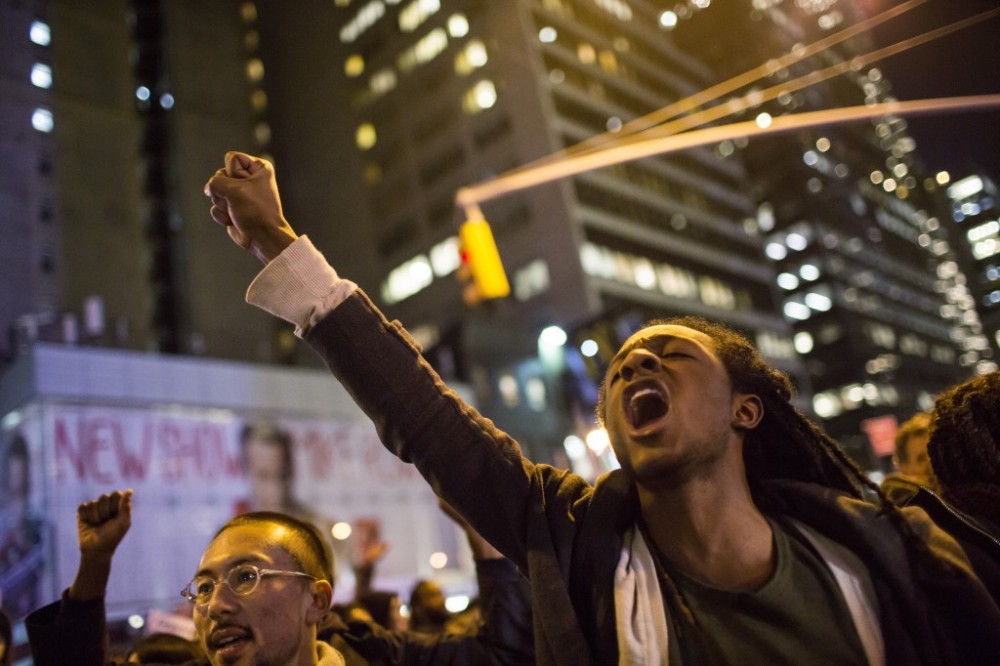Gone are the echoes of words full of enthusiasm and hope that thousands of US citizens shouted to celebrate the arrival of the first African-American President.
«Yes we can», that slogan that accompanied a collective dream, suffers the weight of years that like many other dreams, are beginning to lose color and vitality. Countries, peoples don’t easily erase years of history and aspects of an idiosyncrasy that contributed to their identity.
Today, after the murder of African American Eric Garner (Staten Island), Michael Brown Ferguson (Missouri) and Rumain Brisbon in Phoenix (Arizona) by white policeman, and especially after the jury’s decision to exonerate charges of two of these police officers, Darren Wilson and Daniel Pantaleo, United States suddenly awoke.
The illusion of equality in recent years has been shattered and the whole country is forced to look itself in a mirror that had been avoiding for years: the mirror of racism, intolerance toward others, toward the diverse in color, religion, sexual orientation, economic status.
Racism hides a great fear beneath it, a fear to face what is unknown, a fear to leave certainties. It is the intolerance of who is convinced of its superiority and fears to abandon the rigid structures that supports it.
Americans have felt yet again the sting of old wounds in their skin.
Two worlds coexist in the same country. On one side there are some policemen who have felt free to kill and some jurors that have felt free to declare them innocent. On the other, thousands of people that have taken to the streets to express their outrage and sorrow and to say that there is still people who believe in human rights, justice and respect for others.
These are two sides of the same country, a reality that is not only American but can be found in many other nations. In Europe for example, open and democratic sectors coexist with neo-Nazi who dream of a return to the swastikas.
Each country has lights and shadows inside and has to mediate between these two forces.
But there is something that distinguishes these facts from other contrasts. The attitude from the police and the jury cast doubt on two basic pillars of democracy. The police should be the force that protects citizens, and justice should defend them from abuse. The loss of confidence in both institutions can become a tsunami of unforeseeable consequences.
With which power could a country unable to guarantee security and justice for its citizens, regardless of their skin color, talk about democracy in the world? Is the question that will be rolling in the rooms of power, at national and regional level. President Obama and New York Mayor De Blasio and the state governor, Andrew Cuomo already submitted plans to improve the training of police forces. They know that it is essential to mend the trust of US citizens.
All of us that are emigrants, we suffer at some point in our lives the consequences of fears and intolerances enclosing racism. When leaving our countries we are doomed to transform ourselves into others, in different people. And we remain like this even when we return to the country of origin. Mutations that come from having lived other experiences mark us, transform and enrich us, but we often pay that enrichment rejecting those who think of us as different.
Those of us who left Latin America and the Caribbean in search of other lands also know, for having experienced firsthand two or more times, the contrast between the different souls that make up one land. Many of us live the mistrust of police and justice and we know the profound damage that has generated such distrust in our societies.
Maybe that’s why we deeply value democracy and justice. They are not empty words, they are core values, they are the only passport we have to avoid a return to barbarism. Without justice, without respect and tolerance toward any diversity, there is no possible future.
Translated by Raizel López


